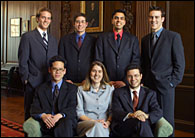Supreme clerks
It is the last word in Canada on matters of the law, and it has spoken. The judges of the Supreme Court of Canada have selected seven McGill law students to be clerks next year.
 The McGill seven -- front row from left: Hoi Kong, Megan Stephens, Menachem Luftglass. Back row from left: Gregoire Webber, Ryan Rabinovitch, Vinay Shandal, Brandon Wiener.
The McGill seven -- front row from left: Hoi Kong, Megan Stephens, Menachem Luftglass. Back row from left: Gregoire Webber, Ryan Rabinovitch, Vinay Shandal, Brandon Wiener.PHOTO: Owen Egan |
|
The prestigious positions, which last a year and start in August 2003, are highly sought after by law students across the country. However, there are only 27 clerkships to go around -- three for each of the nine Supreme Court Justices -- so competition is fierce.
McGill is well placed to supply law students to the Supreme Court. The justices and their clerks need to be able to understand both civil and common law. Bilingualism is also an asset. McGill's law program -- which blends both legal traditions -- is almost tailor-made to those needs.
Not to detract from the achievements of the seven students, of course. In order to be considered, students must have graduated with stellar academic records, impressive and well-rounded extracurricular experience, and remarkable research and writing skills. They're nice guys too -- Hoi Leun Kong, who modestly refrained from speaking of his own accomplishment of being selected for the clerkship, had nothing but praise for his six colleagues.
"They are not only exceptionally bright, but are fundamentally nice and down-to-earth. Each of them belies the stereotypical image of the hyper-competitive law student," said Kong.
The Supreme Court needs to be extremely selective in who they choose for clerkships. No other court in the country has so much power to chart new territory in Canadian legal practice.
"The justices are always looking for fresh perspectives and new ideas for law in Canada," said Shauna Van Praagh, the associate professor of law who helped coordinate the students' Supreme Court applications. The experience of working at so high a level can be a real boon for those selected for the job.
"The value of [the clerkships] is mostly in working closely with other people from across the country, and working closely with the justices themselves. There's nothing quite like it," she said.
Although being able to list a Supreme Court justice as a reference certainly can't hurt a legal career, Gregoire Webber is more focused on the unique learning experience the court offers aspiring legal professionals.
"It's certainly an honour, but I didn't apply because of any honour attached to it," said Webber, who will be clerking for Justice Ian Binnie.
"I see my future in Canada, shared between academia and practice. My experience with the Court would ideally prepare me to combine both of these professional callings."
The cases that are decided by the Supreme Court become the guiding principle for judges across Canada. The decisions judges make are informed by the research and writing of their clerks. The responsibility is enormous, a fact of which the McGill seven are aware.
Megan Stephens will be completing a clerkship at the Ontario Court of Appeal prior to becoming one of Chief Justice Beverley McLachlin's three clerks. She said that she hopes the work of the Ontario Court will help prepare her for the pressure of being at the top.
"It's somewhat daunting. I'm lucky enough to be working with 26 other clerks, so I look forward to being able to turn to them, especially the other six from McGill, who I already know quite well."
Stephens is not certain why she was selected to clerk for the Chief Justice, but is thrilled by the opportunity.
"I was very flattered -- I'm really looking forward to working with her. She's definitely been a role model for me and I think a lot of young women for a long time. It will be neat to work with her one on one," said Stephens.
Normally, potential clerks are interviewed by a panel of justices which includes the one for whom they will work. They are then selected from a "pool" by the judges on the basis of seniority. As Chief Justice, McLachlin gets to pick the first three, but her schedule prevented her from participating in the interview process, and so she was only able to manage a phone conversation with Stephens.
"I haven't met her, so she told me 'when you're in Ottawa, pop in' and I was thinking it's so weird to 'pop in' on the Chief Justice," said Stephens with a laugh.

